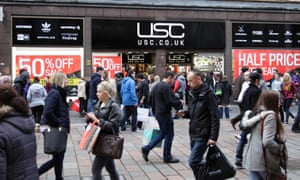Sports Direct, the FTSE 100 retailing giant controlled by the billionaire Mike Ashley, stripped prime assets out of its stricken USC fashion subsidiary in the weeks before the chain collapsed, an investigation by the Guardian can reveal.
The demise of USC, which was controversially bought straight out of administration by another arm of Sports Direct in January, led to about 200 workers being given just 15 minutes’ warning that they were to lose their jobs.
The episode has since seen Sports Direct’s chief executive, David Forsey, charged with a criminal offence for allegedly failing to give the 30 days’ notice required for redundancies under employment law. Forsey denies the charge. Meanwhile, Ashley has been accused of using “disgraceful and unlawful employment practices” during the incident.
The discovery follows the Guardian’s revelations on Wednesday about how the retailer’s temporary warehouse workers are subjected to an extraordinary regime of searches and surveillance, with undercover reporters unearthing evidence that thousands of workers’ pay was effectively below the minimum wage.
The company was branded a “scar on British business” by the Institute of Directors, and was criticised by some of its own shareholders. Opposition MPs demanded the company be investigated by HMRC.
USC went into administration on 13 January 2015, but the Guardian has obtained documents showing that Sports Direct transferred leases of some USC stores to another wholly owned Sports Direct subsidiary, Republic, during November and December 2014.
In November 2014, the lease on USC’s store in Livingston was moved to Republic, while two days before Christmas the leases on USC’s Aberdeen, Doncaster, Dundee, Edinburgh and Hull stores were all transferred in the same manner.
A source close to one of the December lease transfers said: “The change of ownership happened because the USC store was performing quite well and Sports Direct didn’t want to put that into the administration, so they changed the name on the lease to Republic.”
Meanwhile, the ownership of USC’s trademark was switched to another Sports Direct company. That change was registered at the Intellectual Property Office (IPO) on 19 December 2014, less than a month before the administration.
The transfer of the brand out of USC, which IPO documents say had been agreed in 2011 between the two Sports Direct companies, effectively ensured that Sports Direct was the only possible candidate to buy USC out of administration. The swift in and out administration process had relieved the chain of staff and debts.
The collapse of USC caused a huge furore in January over the way Sports Direct had treated staff at its subsidiary and led to a parliamentary inquiry by the Scottish affairs committee in March.

At one session, Philip Duffy of USC’s joint administrator, Duff & Phelps, told MPs: “The only potential purchaser [of USC] I would consider would be a Sports Direct group member because USC only owned the stock in the stores, subject to [licensing restrictions]. It didn’t have any warehouse stock so it couldn’t replenish the stores. It didn’t own the brand, USC. USC [the brand] was owned by Sports Direct.”
Duffy told the Guardian: “The joint administrators have complied with their statutory obligations to file a report with the Department for Business, Innovation and Skills and have acted in the best interests of all of the creditors of the company.”
He declined to make any further comment so as “not to prejudice any future potential recoveries into the administration estate”.
Meanwhile, one insider with direct knowledge of USC told the Guardian that Sports Direct had been transferring leases out of USC and into Republic for months, if not years.
He said that landlords who were prepared to renegotiate leases with USC saw their stores transferred out of USC and into Republic, while those who resisted Sports Direct’s efforts to get better terms were left inside USC. “If a landlord played ball they were OK,” he said. “You don’t win against Mike [Ashley].”

Republic was granted a new lease on the USC store in Brighton in November 2013, while when USC relocated its Leicester store in March 2014, the leaseholder became Republic, despite the shop being branded as USC.
Duffy added: “We were initially contacted on 14 November 2014 and I am unaware of any prior discussions or planning regarding timetables for an administration appointment.”
In October, the Guardian revealed that Forsey had been charged with a criminal offence relating to the collapse of USC.
About 200 workers at USC’s warehouse in Dundonald, County Antrim, lost their jobs – with 80 permanent warehouse staff arguing they had not been properly consulted.
Along with Robert Palmer, a compliance and technical partner at the Gallagher Partnership – who were joint administrators – Forsey pleaded not guilty to a charge of failing to notify the business secretary at least 30 days before the warehouse workers were laid off. The offence of failure to notify carries a maximum penalty of £5,000. Both Sports Direct and Gallaghers declined to comment.
The next hearing in the case is scheduled at Chesterfield magistrates court in March, while a separate civil conduct investigation was kicked off by BIS in October. BIS has the power to ban somebody from serving as a director for up to 15 years.
Timetable leading up to USC administration
14 November 2014: Insolvency firm Gallaghers meets Sports Direct in its role as a secured creditor of its wholly owned subsidiary USC to discuss a debt due.
23 November 2014: USC’s Livingston store is transferred to Republic, another wholly owned Sports Direct company.
17 December 2014: Gallaghers, along with another insolvency firm, Duff & Phelps, meet USC after a statutory demand was issued to USC by one of its creditors (Diesel) for outstanding invoices. The demand had an expiry date of 31 December.
19 December 2014: USC’s trademark registration is transferred out of USC to another company wholly owned by Sports Direct (USC IP Ltd).
23 December 2014: USC’s Aberdeen, Doncaster, Dundee, Edinburgh and Hull stores are all transferred to Republic.
6 January 2015: Notice to appoint an administrator is filed.
13 January 2015: USC enters administration. Only then are 200 warehouse workers given 15 minutes’ notice they are to lose their jobs. Twenty-eight USC stores are sold back to Sports Direct’s Republic subsidiary in the pre-pack administration deal.



